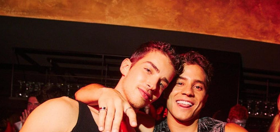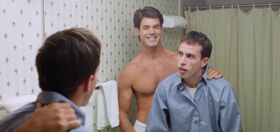
After all of the fantastic documentaries about the early years of the AIDS crisis that have emerged in the past few years — including How to Survive a Plague, United in Anger, We Were Here and Vito — it was only a matter of time before someone made one that focussed on Larry Kramer.
Love him or hate him, and he is a polarizing figure, Kramer’s angry brand of confrontational activism helped to shape the LGBT communities’ response to the plague. He co-founded the GMHC (Gay Men’s Health Crisis, and was later kicked off the board) and founded the AIDS Coalition to Unleash Power (ACT UP). He railed against government and corporate indifference towards HIV as it spread, in particular against New York City Mayor Ed Koch and President Ronald Reagan. He wrote The Normal Heart, the play that essentially told his own fight against the disease and its terrifying impact.
Veteran lesbian filmmaker and activist Jean Carlomusto has done an admirable job with Larry Kramer in Love and Anger (airing on HBO beginning June 29), a feature-length film that shows us Kramer’s beginnings as a Hollywood producer and screenwriter (he was nominated for an Oscar for his Women in Love screenplay), explores the reaction to his controversial 1978 novel Faggots and then walks us through the agony of AIDS. It’s a film that’s as moving as it is informative, a welcome addition to the growing list of documentaries examining the early onslaught of AIDS/HIV.
The history of AIDS, of course, wouldn’t be the same without him. Carlomusto talked to Queerty about documenting Kramer from her New York office.
How about we take this to the next level?
Our newsletter is like a refreshing cocktail (or mocktail) of LGBTQ+ entertainment and pop culture, served up with a side of eye-candy.

Queerty: Larry Kramer told me he was reluctant to do this documentary. How did you convince him to participate?
Jean Carlomusto: Larry was reluctant at first. The first time we asked him, he was like, ‘Oh Jean, so many people have asked me. And at one point someone was starting to do one, and it didn’t feel right.’ Then a couple of things happened that were very serendipitous. I said something to the effect of, ‘I’m going to make a documentary whether you’re involved or not!’ But I knew that Jean wasn’t going to twist his arm in any way he doesn’t want it twisted. He saw a documentary I had done called Sex in an Epidemic and saw that I was very fair with the history, even when presenting people who disagreed with each other. I always told him I’d be really fair. What matters to me is the truth, and the truth is I don’t think anyone can deny his place in the fight against AIDS. Larry was the clarion call, pushing us all beyond what we thought we could do. For that he deserves credit. Collaborating with Larry’s husband David was just as important in many ways, because Larry was sick during a lot of the filming. He gave me permission to shoot in the hospital.
When writing about Larry Kramer at one point, I referred to him as the conscience of the epidemic.
Yes. The conscience — and the anger at the mishandling of AIDS. I don’t think he would have become the person he’d become, if when he’s approached [then Mayor of New York] Ed Koch in 1981 and told him something needed to be done, and Koch had actually done something. I think Larry would have been a very different man. The fact is, everywhere he went in the early days, all that success that he’d had in his early career, none of that mattered. He was just treated like some kind of wacko, talking about a plague that didn’t exist. That made him angry, and it catalyzed this fiercely protective man, who had been dismissed by his father.
I remember going to those ACT UP meetings in New York in 1988. The meetings were so fraught. It was such an intense time.
That was the soil that helped ACT UP to grow. I really associate that room with the heady days of ACT UP, when there’d be 300 people who were engaged in a very democratic process. It was a horrible time, but it was a gift to see such an organized and resourceful response.
You have some great footage of Vito Russo interviewing Kramer on cable-access TV.
I have to say we have some great researchers on this film. Shanti Avirgan, a co-producer of the film, went to the gay and lesbian archives, and they have tapes of all of Russo’s show that he did, called Emerald City. The tapes were literally falling apart as we had them transferred. Thank God for HBO and their technical resources, because we were able to get the recording to a place where it was viewable, and to transfer the tapes.
 You’ve known Larry for a long time. Is there one thing you learned about him while making this documentary that you didn’t know before?
You’ve known Larry for a long time. Is there one thing you learned about him while making this documentary that you didn’t know before?
I saw up close that he’s really fairly shy. That was kind of unexpected, just how shy he is. Except for when he’s trying to get a message across or trying to get his creative work out there, I don’t think he’s someone who enjoys being in the spotlight. If it’s for Larry and his work it’s one thing, but being the centre of attention in a documentary, I think he has mixed feelings about that. The fact that more people are getting to know him right now, he’ll use that to get a new message across. In this case, trying to get to a cure. He brings more eyes to any issue, because of who he is. He’s used his public persona to fight injustice. I think that’s very laudable. I thought that when I started this, that Larry might hate me. I thought I might get skewered. He’s had a lot of outs with people. But I feel even more appreciation for Larry. I saw him fight and come back from an illness that almost killed him twice in a year. I had just watched my father go through a year-long illness and die. I was amazed at the resources Larry pulled together to get back to his work. He wanted to get back to his writing. He’s working on a sequel to The Normal Heart. He wanted to get well to finish that and to be with David.
Did you think of approaching his enemies? Seems like mainly you talk to his friends and allies.
I did. Some of them told me no, that they wouldn’t do it. Hard for me to divulge who those were. Not everybody was pro-Larry in the film. Larry had an awful relationship with some people, and he was thrown off the board of GMHC (Gay Men’s Health Crisis). There are people in the film who profoundly disagreed with Larry. Dr. Anthony Fauci should have hated Larry. Larry said some terrible things about him. Larry and Fauci are still in dialogue about a cure. Larry still hasn’t decided entirely if he was a hero or a villain.
What’s changed about Larry in the 20 years that you’ve known him?
He’s mellowed. I don’t want to say he’s not angry, because he still is. He’s just not quite as vitriolic as he was. I see him as slightly more laid back. But trust me, I still wouldn’t want to piss him off. I don’t think anyone would.






















Chevelter
Love him or hate him? Let’s be polite today and say I don’t love him. Oh, heck, let’s not be polite. I have never met a crankier, deliberately disagreeable and even downright nasty individual.
QJ201
@Chevelter: whose lousy attitude GOT SH*T DONE FOR AIDS
Don’t EVER forget that.
Yes our Hero is an *SSHOLE, but better than no hero at all
lauraspencer
Thank you Larry for speaking up and continuing to do so. It isn’t always easy saying what needs to be heard even when most people don’t want to hear it.
Clark35
@Chevelter: Exactly. He takes way too much credit for things he did not actually do, and he’s crazy, and the definition of a bitter queen.